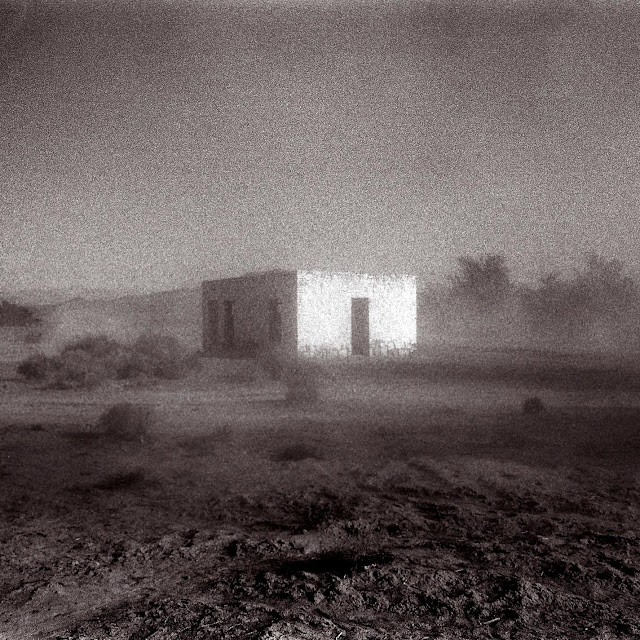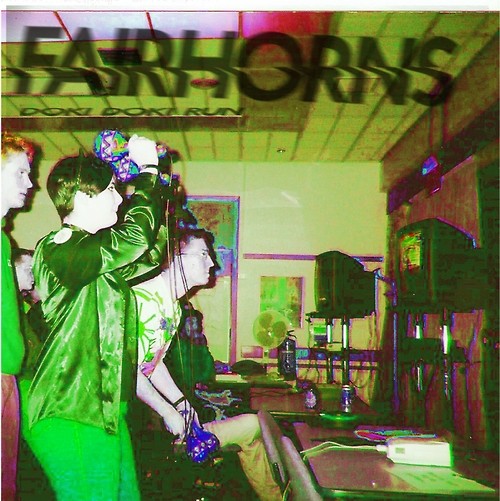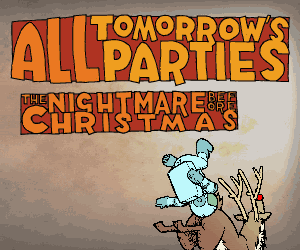
One prominent critique to have been levelled at both Bitte Orca, and indeed more pertinently at Swing Lo Magellan was that the band had perhaps neutralised the quirk somehow, thereby allowing the overall effect to blur. Recent singles may continue to tread on the toes of jittery afrobeat, yet from a man to have once reinterpreted Black Flag's Damaged from dusted memories over a decade old they're perhaps rather conventional. Conservative, even, for a man to have once conceptualised and recited a "glitch opera" concerning the Eagles' Don Henley. Personally, I felt this more penetrable praxis worked thoroughly effectively. Swing Lo Magellan is a sublime record that harnesses the eccentric and channels it into something hugely accessible, hence its lofty chart positioning back in July. Hence the bewildering number of suits in attendance. Hence we're here in London's finest establishment; the incongruous, mid-19th railway architecture jewel in Camden's crown of utter, utter shite. "We're so excited to be here. It rules", Longstreth noncommittally proffers prior to an actually exciting Cannibal Resource. All soft wafts of Sunburst Gibson and strobe, it's conclusive proof of Dirty Projectors as the sorta sing-song band their ignoble beginnings could never've projected.
Inevitably, projections of this and that provide the backdrop. A luminous rework of Rob Carmichael's Bitte Orca artwork – a rework in itself of course of Longstreth's very own artwork for '02/4 E/LP Slaves' Graves & Ballads – to begin with, although indecipherable hieroglyphics and such later feature. You've practically to crick the neck to see them, so abnormally enormous is Longstreth. Were they at a reasonable height he'd most likely stumble outta here with a couple scorched retinas for his troubles. He's somewhat ungainly too; a gangly squiggle of human. He waltzes with his skyscraping mic stand, guitar dangling lifelessly from lissom shoulder. Streamlined to a four-piece he, the indispensable Amber Coffman, bassist Nat Baldwin, and newly acquired yet already expert drummer Michael Johnson emerge, as the evening aptly drifts into the title track from the latest. It may be as good a place to start as any in name, although in ambience it's perhaps all too torpid. Thus far support Callers have failed in arising above the fog of chitter chatter, and a perplexing blend of dub further distills a sense of stillness prior to. If his vocals may be beautifully strained, then so too is the expression pained across his face: one of genuine consternation and disconcertion, he evidently lusts for our involvement. And alas, although the track may pertain to the warm and embracing sepia sound the glow seeping from the stage may insinuate, our reaction is unduly cold.
The lights are extinguished and, out from shadowy silence, they are suddenly six as the murky, yet with it distinctly bright polyphony of LP opener Offspring Are Blank comes into the evening. These Dirty Projectors suddenly judder into focus, and come into their own with Longstreth – flanked by his trusty harem – an immediate focal point. At its grossly dynamic chorus, eruptions of light emit from beyond glimmering, skeletal silhouettes – they're evidently getting into this bigger gig malarkey. These are the bursts of strobe from a bloody Muse show, and indeed elements of the histrionic reside within as the senses are unapologetically overloaded, the newly expanded sextet imbuing things with an unprecedented sense of the epic. Then, those bubbly guitar lines now renowned of Longstreth at long last begin to effervesce with a dumbfoundingly jocular take on The Socialites: lyrically jejune, Coffman downs instrument and ups the ante as she uptakes the gender ambiguous to chirp of pretty girls and sheepish advances. Her vocals undulate like swallows gliding atop a giddy air, and not only does she wrestle some attention off of Longstreth, but is also far better acclimatised to spotlight glare than he.
Yet with an increasing vocal reliance on his accomplices, there's ample room for him to work wonders across the fretboard. As the room begins to move – spinning dizzily on the zesty glee of it all – ample room for his inimitable guitar jiggery-pokery is forged. He works himself into a sweaty lather, and looks all the better for it. Although that it's no longer all about the author throws light on the brilliant equilibrium the Brooklynites strike. From the lights, to the overall feel, to the general vibe everything operates in honed synchronicity. They're spandex-tight throughout, and never more so than when the girls take the lead on Wittenberg IV, aka Beautiful Mother. A differentiation in terminology must be made between gig and concert, and as the Medieval chamber tones of Coffman, Haley Dekle and Olga Bell amalgamate to ascend, they bring us closer as the mood slips into the latter category. For despite toning down the esotericism somewhat (and as I say their distant pasts aren't so much as fleetingly touched upon) tonight we, collectively, have been discernibly unappreciative of their estimable craft. Until now. Their elastane harmonies twanged by tom thuddery, our appreciation is both profuse and effusive. Praise the Lord – such choral euphony is worthy of a goddamn church; let alone this listed sonic cathedral steeped in a bygone decadence. "Show us your tonsils", yells a somewhat overzealous lad. It's an odd reconstruction of a pretty despicable misogynistic idiom, yet it is one that is somewhat indicative of the band as they represent something somehow desexualised, meanwhile seductive. Comprising equal numbers of XX as XY, the keen balance is kept as despite a patent intimacy, each individual rapport appears to err on the platonic prerequisite for any forms of unwavering professionalism.
Then, as they swing into the flighty See What See Seeing, the pendulum shifts back to Longstreth. It's his turn to plunk down his weapon of choice; to stalk, and skulk, and swagger as we've never seen him do before. Our ungainly beloved, he pukes a rap-styled "uh" before receding back into indie darling modus operandi, performing cute enactments of the words slithering out from his mouth. He'll outstretch his neck in avifaunal intrigue to the line re: voyaging shoreward to the gulls and guillemots; tussle the fop atop his skull to the cerebral screech of its chorus. It's one of umpteen pieces enhanced infinitely, when just hours ago it'd seemed that they could only be tweaked and loudened up a couple notches at best.
The gangly, tangy string tangles of No Intention – deemed "an older song" by a now almost chatty Longstreth, thereby accentuating just how entrenched in the now they've become of late – gives he and Coffman a shot at a mean and twinkly twin fret workout, which is navigated with an unfathomable poise. Merited high fives are made once complete. Moreover though, the Bitte Orca track substantiates the notion that, despite all those ills committed by the ever odious Ezra Koenig, a hybridity of East Coast erudition and afrobeat doesn't have to be wholly abhorrent. About to Die, one of those latter-day singles aforesaid, continues this theory as its thuddy drum samples join a conga line of mirthful tropical guitars and assorted jangly bits veneered with the sheen of a Hank Marvin Strat. It's a hit, but my gosh don't they just know it.
Just From Chevron, conversely, is just about the most abstruse of recordings aired: hinging on an impossible intricate, syncopated clapping pattern that inevitably goes awry once we're invited to engage, if its words roll around being "over the hill" then it's the sound of them emerging over the hump of compromise, every ounce of integrity still intact. And still with this newfound comparative simplicity comes symmetry, as everything once again appears to be in its right place. "We got matching guitars! Pretty cool – twin Sunbursts", enthuses his inner geek. Both lengthy of lock, that Longstreth be a lefty and Coffman right-handed lends further harmony. However that Johnson be skewed a metre or two stage-left nods toward the troupe's penchant for the rhythmically off-kilter. Whether intentional or otherwise, it's an inspired piece of staging. Anyhow, you can practically smell Dr. Ducks' Ax Wax in the air as they launch a two-pronged assault on the direful avant-garde brood of Maybe That Was It. Bedevilled red lighting and the sound totally immaculate as ever within this annular expanse, it's stunningly perfect and perfectly stunning all at once.
As is the paranoiac skitter to Gun Has No Trigger. Dedicated to burgeoning Brit folkster Sam Carter – coincidentally the name of Longstreth's best five-year-old friend and stranger still, yet equally irrelevantly, the name of an old acquaintance of mine – the boy must've done something right, as it is a breathless exercise in vocal aerobics. Skiddly-be-bop jazz drums combine with a clunky, huggable bass line to emanate the impression of Ronson involvement. Its backing almost sounds like something off a lost collection from Camden stalwart Wino, although again vocally it's more of where she may be above than it is of where we are down here.
Useful Chamber brings with it an unorthodox marathon wig out – a wit out almost, as they'll effortlessly outwit many a contemporary on these sorts of evidence – as condensed guitars boil over into climax. The inevitable encore comes, with Dance For You finding the ensemble in a truly ebullient rut; one worth disappearing down and hibernating within until – equally inevitably, or perhaps only optimistically – they return come the summer months for a slew of festival shows. It's one to dance to 'til the deep, meaningful motives for all existence be solved as is, incontrovertibly, Stillness Is the Move. Having been first cracked quite so long ago, it may have lost a little of its initial fizz although it's yet one to jive away to 'til the lights come up. It's inadvertently telling, too, of how the band's approach may have changed with time. Where once they seemed staunchly set in their resolute ways, they've since adopted this more exoteric form. Inertia exchanged for the more easily intelligible, it's working. Working wonders, even.
It dwindles swifter than it shimmied into life mere moments ago, although in an unforeseen turn our adoration is consummated by the astonishing inclusion of Impenetrable Question. Having been bawled for throughout, it's an utter joy once it is finally brought forth. Somewhat unexpected yet in no way unwanted, it only consolidates the thought prominent throughout that they're desired in the lives of all in attendance, and indefinitely so. The show itself is of the perfect length, and is impeccably executed. Longstreth, meanwhile, is darn meek yet more masterful, and whether they may reside in exo- or esotericism, we'll continue to whoop their every move. Still essential.























